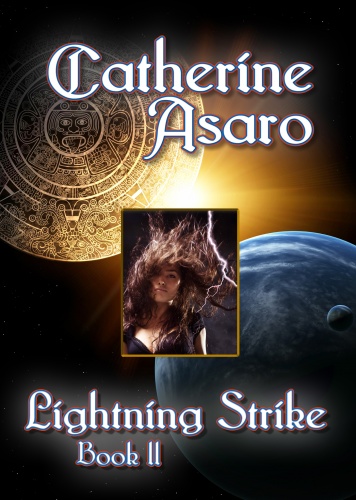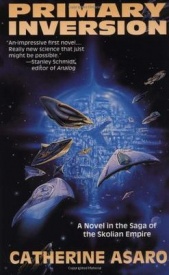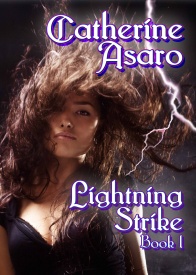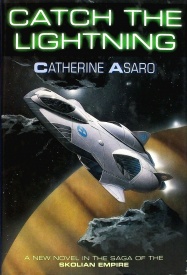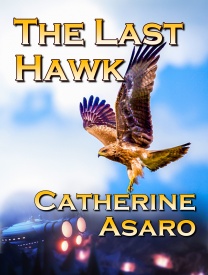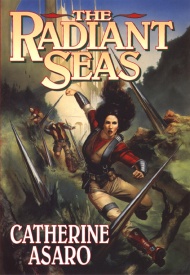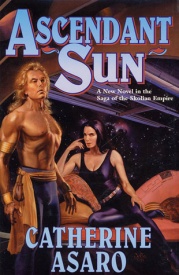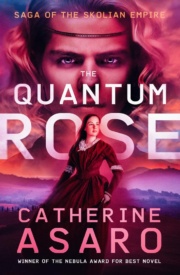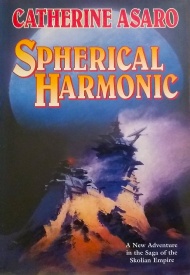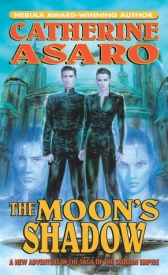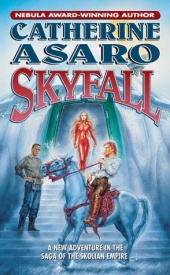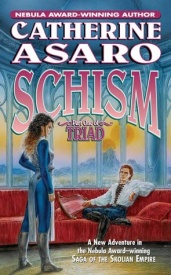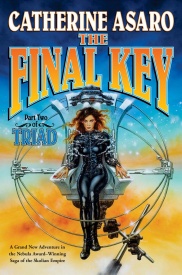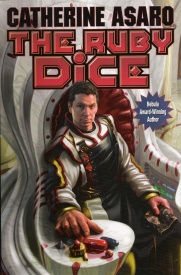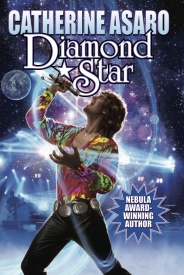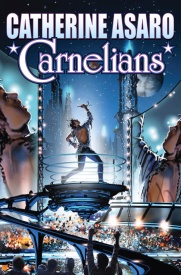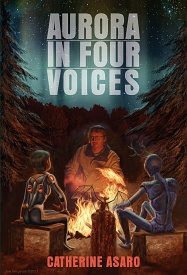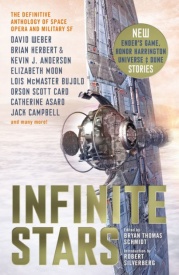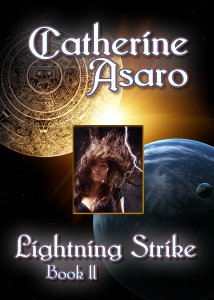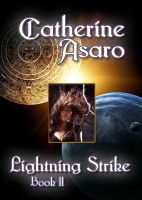Lightning Strike, Book II
Book 2 in the Saga of the Skolian Empire
A new Universe. A new Time.
Tina Pulivok is thrust into an unknown universe, a reality that exists hundreds of years ahead of her own time. Raised in a Maya village, and then later in an East L.A. barrio in the 1980s on Earth, she knows no one in this new universe—
Except Althor.
A starfighter pilot from the future, Althor ended up in the wrong universe when someone—he has no idea who—sabotaged his fighter with the intent of killing him. Instead, the faulty stardrive threw him into Tina’s universe. Both Tina and Althor are empaths, traits that draw them together. They return to Author’s universe in his sentient ship, where they face dangers known and unknown. From the vicious empire of the Trader slave lords to the ancient marvels of desert ruins holding the secrets of a long vanished past, they must survive an onslaught of danger. They face the future with only their courage and their love–but will it be enough to keep them alive?
Start Reading
Lightning Strike, Book II
Excerpt
Jump to Ordering Options ↓
Chapter One
Epsilani Station
Before today, I knew only the warm and drowsing days of my life in East Los Angeles. I met Althor while I was coming home from my waitress job late at night. Lost and confused, he stood in the middle of a desolate street and asked for help. Can you tell me where I am?
With that one simple question, he changed my life.
The days that have passed since then feel like eons. I still can’t believe I’ve abandoned the faded tenements and ragged streets of my home in L.A. to come to this new—
This new what?
A new universe. I understand nothing about it except for one fact; this universe is home for Althor, a star fighter pilot who became stranded on my world. I’m like a child who has never seen water dropped into a lake. I struggle to stay afloat. I have no raft, no boat, nothing except the tenuous lifeline of my connection to him. I am a stranger here and I can never return home.
It was my choice to come with Althor. I am exhilarated—and terrified.
†
I sat in the copilot’s chair of Althor’s ship, what he called his Jag starfighter. A holographic map, or holomap, floated above the control panels in front of my chair, showing a view of space outside the ship. The Jag had personalized the map for me, even adding my name in the lower right-hand corner. Tina. Such an ordinary name, the only “normal” part of this situation.
The holomap displayed the world Athena. I still found it hard to believe, that I sat here on a ship approaching a world I could never have imagined. The map showed a spectacular view of the planet, a gas giant banded by blue and red stripes, like caramel and blueberry ice cream. I counted at least seven moons, and a faint ring. A glinting speck also hung by Athena, a shiny bit of metal silhouetted against the vivid colors of the atmosphere. Far beyond the planet, the star Epsilon Eridani shone in space, not as large as the sun as seen from Earth, but still a beauty.
Althor sat in the pilot’s seat of the cramped cockpit. The metallic overtones of his hair caught glints from the harsh light. He otherwise looked normal, taller and more muscular than most men, at least in my universe, but otherwise human.
Almost human. His inner eyelids had lowered, hiding his eyes with a gold sheen. He’d told me his ancestors engineered the lids to protect their eyes from harsh sunlight. I wasn’t sure he realized the lids also came down when he felt threatened. Even as I watched, they retracted, revealing his violet eyes. He was staring at the holomap over his controls with a relief so subtle, I wouldn’t have noticed if my empath’s mind hadn’t become so attuned to his emotions. Until only a few moments ago, we hadn’t known whether we would arrive safely or get blown to bits when he took his ship back to normal space. We could have exploded into uncounted particles spinning across this stunning but unforgiving starscape.
Athena grew in size on the holomap as the Jag continued its approach. The metallic “speck” orbiting the planet resolved into a tiny circle. I had stayed silent as we entered the star system, too awed to speak, but now I found my voice.
“What is that little circle by the planet?” I asked.
Althor glanced at me with a start. Then his face relaxed and he smiled, the faint lines crinkling around his eyes. “A space station.”
“Oh.” That was a space station? I’d expected something more dramatic. It looked so small, like a jeweled ring I could slip onto my toe.
As we drew closer, details of the station became clear. It resembled a spoked wheel. Mirrors set around the ring reflected sunlight onto it, sparkling like diamonds. They looked as if they were “above” the station, but I doubted “above” and “below” had meaning. My sense of direction failed me here, where only the safety webbing kept me from floating out of the seat. If we’d come at the station upside down from our current direction, I wouldn’t have noticed, except the mirrors would have looked as if they were below the ring.
I exhaled slowly, calming my pulse. It’s a bicycle wheel, I told myself. Nothing dramatic, just a harmless wheel in space. Six spokes radiated out from its central hub. Relative to us, a stem extended down from the hub, and some sort of giant petals surrounded the wheel. It looked like a metal flower. As the station grew larger on our screens, the “stem” resolved into a chain of spheres.
“That’s amazing.” I was the queen of understatement today. “What are all those beads and the petals around the station?”
“The petals are a grid,” Althor said. “Radiator. They bleed off excess heat. The spheres, they are manufacturing plants.” For some reason, his accent sounded heavier than usual. “For the torus.”
“Torus?”
“The rim of the wheel. This is where the people live.”
People. Would they be like those in my universe? Althor seemed human, but he wasn’t the same. I still found it hard to imagine even after I’d seen evidence of the changes within his body, an internal system that enhanced his reflexes, strength, and speed. He had in his spine with an EI, or evolving intelligence, that augmented his mental abilities. His skin, eyes, and hair had a slight metallic quality, genetic tweaks meant to adapt his ancestors to a world they had settled. He was a fighter, a warrior from another time and place. I loved him, at least I thought I did, but I didn’t understand him, not really, not the way I knew the friends I’d left behind in Los Angeles.
Here in Althor’s universe, they called the country where I’d lived the United States. In my universe, we knew it as the Federated States. From what little I had learned so far, his universe didn’t differ that much from mine—except for the Big Change. Time here was shifted compared to my universe. Althor had found me in what he called 1987; by coming her with him, I’d entered the future. He said I’d stepped from a world where even “cell phones” didn’t exist, whatever that meant, into a star spanning civilization.
I told myself I could deal with this jump into the future. I’d made large changes before, never anything like this, but enough that I learned to cope with dramatic shake-ups in my life. Before moving to America, I’d grown up in the Maya village of Zinacantan in the mountains of Chiapas, Mexico. Maybe I could look for my people on the Earth of this universe. Would it matter, though? I’d never find anyone I knew. If my friends and family, or even myself, had ever lived here, they had died centuries ago. Even in my own home I’d lost my family, the mysterious father I’d never known, my aunt and uncle who died during an earthquake in Chiapas, my mother to cancer, and my cousin Manuel to violence in L.A. In the eighteen years of my life, I’d left behind so much pain. I hoped this universe turned out better. Maybe here, with Althor, I could heal.
If we survived.
The station continued to grow, filling the holomap. Another small speck appeared, coming toward us from the hub of the wheel—and with a start, I realized that “speck” was a ship.
My perception of the scene changed with a dizzying lurch. Only distance had made the station look small. That “little” ring was huge. If I’d had to guess, I’d have said it stretched more than a mile across. Mile? I had no clue how to think of lengths here. We had used kilometers in Mexico. Althor’s people might use something I’d never heard of.
“Do you recognize that ship?” I asked. “It looks like it’s coming at us.”
“It is.” Althor sounded unconcerned, but he was hard to read. Although I often felt his emotions, today he shielded them.
Empath: he’d given me a name for the curse I’d always hidden. I could feel the moods of other people. Apparently I had an even more unusual trait. The empathic centers in my brain were cross-wired with my senses; I perceived emotions with colors, sounds, smells, even tastes and textures. Anger gave the world a red cast, with sour notes. If someone laughed, it created a rainbow. Althor’s love for me surrounded him like a golden glow, warm against my skin. Althor called it empathic synesthesia—and with those two words, he changed my life. I wasn’t crazy. Just different.
So okay, we were both empaths. It had drawn us together. Or so he claimed. At this moment, I was picking up exactly zilch from him.
“This ship you see,” Althor said. “The one coming at us. It is—what is the name? Faraday drone. It take us inside the plasma core.” He paused, then corrected his speech. “Will take us.”
I wondered why he had trouble with English. Although his Spanish always sounded awful even when he his implanted node helped him translate, we could use English, which he usually spoke better than this.
“I don’t know what you mean by plasma core,” I said.
“Is a well of electrons. About a thousand coulombs.” As he turned back to his controls, he added, “The magnetosphere of Athena, it protect the station some, but not enough. The well does the rest. It holds the station at a potential of fifteen billion volts.”
Fifteen billion? “That sounds like a lot.”
He glanced at me with a gentle look. “It shields the station from cosmic rays and solar flux. The plasma core, it is ionized gas. It repel particles and keep radiation at safe level.”
Although I didn’t fully understand, I got the gist of it. I liked that he treated me as if I had a brain. Someday I’d figure out the details, assuming the people here didn’t refuse us entry. We needed their help. His ship had taken damage, though he didn’t know how, not yet. It was how he ended up in my universe, thrown there by an engine that played with relativistic physics on a level beyond anything in my time. Something had gone wrong, hurling his fighter through a break in spacetime and into orbit around the wrong Earth.
From what I understood, humans in his universe had spread so far across the stars, many no longer considered Earth their home. Those were Althor’s people, the Skolian Imperialate. He served in their military. The people in charge of this station actually did come from Earth, the one in this universe, which made them members of the Allied worlds of Earth. I tried not to dwell on what they would think about us showing up in a heavily armed Jag starfighter piloted by a Skolian military officer. For all we knew, they’d shoot down the Jag.
The Faraday drone continued to approach. It grew in size on the holomap until it blocked our view of the station. Its front end opened like a gigantic metal flower, and we sailed into the drone, past unfurling petals that dwarfed our ship. The inside formed a metal cavity braced with struts. If I hadn’t already seen the drone matching its speed to ours, I’d have thought we stopped moving once we were inside.
All the time, the Jag continued to communicate with Epsilani Station. Their exchange sounded like a computerized song in the background. Although some people from the station spoke English once they figured out Althor could understand them, they had heavy accents and a manner of speech I found hard to understand. On our end, the Jag did most of the talking, though at one point Althor answered a question, something about accepting data on a comm.
The holomap switched to a view from the space station showing the drone’s approach. It moved through space like a closed flower floating towards Epsilani Station.
Althor flicked his finger through the holomap, indicating what looked like a feather trailing off the end of the drone. “See that?”
“It’s pretty,” I said. “What is it?”
He glanced at me. “An electron gun.”
Ho! That was one big gun. “Why? We haven’t done anything to them.”
“Is not weapon,” he said. “It bleeds electrons to equalize potential between us and station.”
“Oh.” As long as the gun did the bleeding and not us.
A message flashed into my mind. I stiffened, caught off guard, rattled that I heard Althor’s ship in my thoughts. Of course he communicated with it that way; the node in his spine linked to his ship. Tech-induced telepathy. As Althor and I had grown closer, our minds intertwined until at times I could catch his outermost thoughts. Our brain waves interacted, or so he said, with the signal boosted by specialized neural structures. Those brain organs remained vestigial in most humans, but we had a genetic mutation that caused them to develop. We had somehow developed enough mental resonance that the Jag could connect to me as ell. It sounded amazing. And weird.
I caught a message from Epsilani to the ship, something about handling a “wind” created by the repulsion of electrical charges on the drone. The Jag was adjusting to my brain, finding ways to present the data so I understood. In my mind, I “saw” the message arrive as if it were a glass-blue beetle winging through space. More datoids appeared, like a swarm of bottle-flies, their contents telling the Jag how variations in the plasma density protected the station.
Cool, I thought.
I am glad you approve, the Jag answered.
The drone headed toward the hub of the wheel. That central sphere had looked like a bead, but I realized now it dwarfed our ship. Equipment jutted out from it, towers, cranes, and portals. The drone opened its petals and they locked into the hub like a jigsaw piece clicking into place.
A voice said, “Docking complete, Commander.”
I jumped. “Who is that?”
Althor spoke into the comm. “Got it.” He tapped off the comm and turned to me. Dark circles of fatigue showed under his eyes. “That was our contact at the station. Before we go further, I need to talk to you.”
I tensed. “What’s wrong?”
“I’m not sure what we’re facing.” He took a breath. “My ship had damage even before I reach Earth, I don’t know how or why.”
I spoke quietly. “Or who did it.”
His met my gaze. “Yes.”
“Do you think someone here might connect to whoever sabotaged your ship?”
The Jag answered, speaking in the cockpit. “Probably not. We have no connection to these people and no reason to think we’d stop here for repairs. But we can never be sure. We don’t know who damaged my systems, or why.”
Althor motioned at the great wheel of the space station arching across the holomap. “I would prefer if no one here learns about my mother’s relation to the Imperial Assembly.”
“Okay.” It wasn’t like I could say much. I knew nothing about her except what little he’d told me. He called her the “Assembly Key,” some sort of government official involved with computers, or whatever name that technology had in his universe. “What do you want me to do?”
“Reveal as little as possible.” He took my hand. “Just follow my lead.”
I curled my fingers around his. “All right.”
†
Thoughts whirled in my mind as we prepared to board the space station. I was taking my first step into this new universe. Yes! The experience would shake me to the bones, rock my socks, turn me on my head. I held my breath as we exited the Jag and entered—
A little round chamber.
Seriously? This was it, a round room with white walls? That felt about as dramatic as a piece of bread.
We didn’t actually “step” into the chamber. We floated. It had no gravity, so we drifted through the air. The sphere had nothing on its curving walls except another hatch opposite where we entered. The surfaces glowed white and bathed us with in warmth.
“Bacterial contaminants detected,” a woman said. “Shall I proceed with decon?”
I blinked. Who was that?
“Go ahead.” Althor glanced at me. “You are all right with this?”
“With what?” I asked.
“Decontamination.”
“We’re not sick.”
“Is normal,” he said. “Everyone carries bacteria and other organisms. The decon system thinks some of ours are maybe harmful to the station. If we refuse decon, we can’t come aboard.”
“Is it safe?”
“Completely.”
“All right.” A thought occurred to me. “Does it want us to scrub down?” I imagined the two of us in a shower, and the light from the walls seemed warmer. Nice.
Althor smiled at whatever he picked up from my mind. “Unfortunately, no. It just released nanomeds to nullify any harmful microorganisms.”
“I don’t see anything.”
“They’re too small. Nanomeds are essentially molecular laboratories. They float in the air.”
“Oh.” So much for my sexy shower images. The lack of gravity was also a lot less fun in reality. I had no clue how to maneuver. I was rotating relative to Althor, my motions lazy and subtle. If I grabbed his arm, it would push him into a drift, too, besides which, hanging onto Althor would make me look even more debuzzled than I already felt. At least it gave me a reason to use “debuzzled,” my favorite word from the book Finnegan’s Wake. I’d spent months working my way through that weird novel even though my friends made fun of me for reading some story that didn’t even sound like English. It was a cool book, no matter what they thought.
“Decon complete,” the woman’s voice said. “Welcome to Epsilani.”
Across the chamber, the edges of the hatchway glowed green—and Althor’s inner lids rolled down, hiding his gaze behind their metallic shimmer.
The hatch irised open and six people floated into the chamber. I stared at them, fascinated and wary. They had the dubious honor of being the first people to meet me in this new universe. The man in the center looked unusually tall, almost as big as Althor, but less muscular, with graying temples and a confident air. He seemed familiar, though I couldn’t have known him. He lived in another universe, one in the future of mine. Then it hit me; I recognized the quality of a leader in him, someone comfortable with his own authority. He reminded me of Mario, the head of Los Vatos de la Calle San Carlos, or just VSC, the gang my cousin Manuel had run with. Mario and this man had that same confidence, though they were literally worlds apart. VSC had become my family after Manuel died, and now I’d lost them, too, by choosing to come here. My eyes burned, but I held back the tears. Damn it, I wouldn’t embarrass myself in front of these people.
I suspected I didn’t fool them, at least not the black man floating to the right of the leader. Tall and angular, with tightly curled hair, he watched me with an intent look. He had a natural grace and seemed faster than the others, though he didn’t move any differently. It was more a quality of contained energy, as if he were bursting with life.
The remaining people in the group, two women and two men, looked like guards. Each had a gun holstered at the hip, a tube actually, with a black hand-grip. I didn’t need to recognize their crisp blue uniforms or those weird guns to know them. Whatever they called their job here, their attitude plainly said, “We’re cops.” They didn’t trust us any more than we trusted them.
Everyone except me moved easily in free fall. Our hosts floated forward and stopped in front of us. How did they manage that? They had no way to halt their motion that I could tell. Maybe they used air-jets or something I couldn’t see, exerting a force to change their speed. I remembered that from high school physics. I’d loved that class, a fact that seemed to annoy certain people. The school counselor had wanted me to take Home Economics. She told me I’d have the skills to be a maid. I respected the job; several of my friends started a maid service. I wanted to learn math and science, and so I did, and the hell with anyone’s objections. I’d dreamed of being a scientist, or a code breaker, or someone who worked with math. So I ended up as a waitress when I graduated, but it offered a respectable job that let me save money. When I had put away enough, I planned to attend college. Well, at least I had then, before I disappeared into a new universe.
The leader spoke to Althor. His accent sounded vaguely British, but he spoke English in a different way than I’d heard before. When I concentrated, though, I could understand him.
“Welcome, Commander Selei,” he said. “I’m Max Stonehedge, the Director of Epsilani Station.”
Althor nodded, his expression as shuttered as his eyes.
Stonehedge glanced at me, then back at Althor. “Perhaps you’d like to introduce your….”
“Fiancée,” Althor said.
Ho! Who’d have thought I’d be somebody’s fiancée. That word sounded like it came from another world as much as everything else here.
“Ah. Yes, you did ask about a minister.” Stonehedge smiled at me. “Hello, Ms.—?”
“Pulivok,” I said.
Stonehedge indicated the black man at his side. “This is Doctor Wachiru Kiragu, our expert on Skolian physiology.”
Kiragu grinned. “Hello.” His gaze shifted to the blood-soaked bandage on Althor’s shoulder and his smile faded. “Commander Selei, your shoulder looks like a mess. We should get it treated.”
“It is a bit—stiff,” Althor admitted, his accent even heavier than before. His spinal node usually helped him speak other languages, but it wasn’t working so well today.
“We can go the med center,” Kiragu said. “If you don’t mind saving formal greetings for later.”
“Med center is fine,” Althor said.
So we went with our hosts. Althor took my arm and helped me across the chamber while the security officers surrounded us. We went through the hatch—and came out into a huge sphere. This had to be the inside of the hub we’d seen from space. And hey! About fifty yards away, a group of people were flying around, laughing and tumbling in the air. A gymnastics class? They flipped in wild rolls, soaring through hub. One of them called to Stonehedge and he waved back.
I smiled. “That looks like fun.”
Stonehedge laughed good-naturedly. “It is.”
Althor showed no reaction, and he continued to shield his eyes. I knew he could see through his inner lids, but from the outside, they looked opaque, like a gold sheath.
We left the area through another hatchway, entering a passage that circled the hub. For some reason, the opposite wall slid by as we watched, its blue and silver markings moving steadily to our left. It took me a moment to understand. That wall formed part of the space station wheel, which rotated around this stationary hub.
We floated into the passage and used handles in the hub wall to help us move along its curve, going opposite the rotation. It reminded me of walking against the turn of a merry-go-round. I’d have never imagined in my childhood, when I had the rare opportunity to ride one of those circling delights, that someday I’d get to float on the mother of all merry-go-rounds out in space.
Within moments, we reached a double door in the moving wall. As we gripped handles around it, Stonehedge tapped a panel in a panel by the doors. They slid open, revealing what looked like an elevator car, except nicer than any other I’d seen. Coppery art hung on its walls and a gold rug carpeted its floor. Light diffused through a white ceiling. Delicate paintings of parrots and bonsai trees formed a border at waist height.
After the doors closed, a low hum came from the walls. And that was it. Something must have happened, though, because we drifted upward, and after a moment, we floated to the side. Gradually our weight increased, until we settled onto our feet. After that, it felt as if we were going “down,” though I thought we were probably riding outward, away from the hub and toward the rim of the wheel. Oddly, that slight pressure still pushed us sideways.
While we rode, Director Stonehedge told us about Epsilani Station. About three thousand people lived here, a long way from their goal of ten thousand, but still a thriving population. They built this habitat as a science research station, a joint effort by Europe, Britain, Japan, Kenya, Ghana, Morocco, and America. The wheel of the station had a diameter of almost two kilometers. What struck me more than the size, though, was how fast it turned, one rotation every minute. The sideways push we’d felt came from Coriolis forces, which increased with the speed of rotation.
I gradually adapted to the way Stonehedge spoke. A strange feeling rose within me as I listened to him describe the marvels of their habitat. Violence and confusion had filled the last few days before we reached this station, with Althor and I desperate to reach the Jag. We’d had to deal with Nug, the cruelest bastard I’d ever met, a psychopathic drug runner, rapist, and leader of the gang that murdered my cousin Manuel. Nug tried to kill Althor—and paid for it with his life. Although Althor fought back in self-defense, the cops didn’t believe him. What could we say, that he was an enhanced fighter pilot from the future who’d gone into combat mode? We’d run from Nug’s men, from the police, from the Air Force, from everyone. Even before that, my life had been hard for so long, it had become part of how I saw the world. This felt so different, it took a moment to recognize my feelings. Amazement. Relief. Gratitude. Incredibly, I’d lived to see this miracle.
Stonehedge’s attempts to get Althor to talk met with no success—until the director found the key. Engineering. When he talked about how they built the station, Althor’s interest spiked and his inner lids retracted, revealing his eyes. He was a rocket man. No doubt about it: he loved space engineering.
So I heard far more about the Epsilani tech than I’d ever expected. They built the station using titanium from Athena’s moons, constructing large sections by using metal-vapor molecular beams, which sounded essentially like they sprayed metal atoms onto gigantic balloons. Nano-bots doped the vapor and acted as a substrate for the titanium. The bots formed a station-wide picoweb within the material, helping to keep Epsilani in repair. If a dust particle or small meteor drilled a hole into the station, the picoweb dispatched its trusty bots to fix the damage.
The “gravity” increased as we rode the elevator, coming from the station’s rotation. The wheel was almost two kilometers in diameter and yet that huge circle rotated once every minute. The longer we rode on the elevator, the heavier I felt. When my weight felt almost normal, we stopped. The doors opened and we walked out—
Into wonderland.
We stood on a gleaming platform that circled the elevator shaft. No, not shaft. We’d come down one of the wheel spokes, and it rose from the center of the platform like a huge column, up and up until I had to crane my head back to see its extent. The column reached a “ceiling” far over our heads, one designed from a transparent material that showed the star-strewn beauty of space outside the station. We’d reached the rim of the wheel. The ground under our feet was its outermost surface, and the ceiling formed the inner surface of the rim. Beyond the windows, the spoke stretched through space to the hub. The mirrors I’d seen outside the station reflected sunlight into the torus here, and it streamed around us, more golden than on Earth.
“Madre de Dios,” I murmured. I wasn’t sure what I’d expected, maybe expanses of metal and functional equipment, but I’d never imagined this. A gorgeous park stretched before us. It resembled pictures I’d seen of the Japanese Tea Garden in San Francisco. Unlike any garden on Earth, however, this one curved up in the distance until it went behind the arch of the ceiling. A river ran down the center of the park. A river. Delicate bridges arched over the water, and trees spread their branches in leafy shelves.
Something seemed off, though it took me a moment to realize what. No shadows. The sunlight streamed in from all directions, so no single source existed to create a shadow. On either side of us, the park sloped up the sides of the torus. Houses were built into the slope, terraced buildings with many windows and patios. Some had no roofs. It seemed strange, but then, why would you need a roof other than for privacy? The colonists who lived here controlled the weather. They could make every day perfect.
Stonehedge was watching me. “Do you like it?”
“It’s amazing,” I said. “So pretty.”
He smiled and lifted his hand, inviting us into his paradise. We descended a staircase to the park and walked along a path tiled with blue stones. Bonsai trees bordered the pavement, and pink lilies bloomed everywhere. We passed people taking a stroll or riding bikes, sleeker models than in my universe. Dogs ran in and out of the bushes, cats prowled, red and blue birds sang, and a rabbit bounded out of a glade. Water rippled in a nearby pond as a fish jumped up in a spray of drops. The air smelled clean and fresh.
“Eventually the station will become self-sufficient,” Stonehedge said as we walked. “We won’t need the supply ships from Earth then. We devote large sections of the rim to agriculture.”
I thought of the mountains where I’d grown up. “You need rain to grow crops.”
“Sure, we can make it rain,” he said. “We usually use irrigation instead, though, to conserve water, both for the plans and the livestock.”
“What about metal?” Althor asked. “I don’t see any factories.”
“We mine chemicals and metals from the moons orbiting Athena.” Stonehedge brushed his fingers along a bush by the path. “Our plants also help make the habitat livable. Photosynthesis from the sunlight regenerates the oxygen and removes carbon dioxide. We recycle everything.”
“It’s incredible,” I said.
Doctor Kiragu motioned toward several buildings about half a kilometer away. “That’s the medical complex. My office is there.”
“We walk?” Althor asked. His face had paled, and new blood stained the bandage on his shoulder.
Kiragu took one look at him and said, “No. We’ll ride.” He indicated a rail that ran by the river. “We can take the mono-hoot.”
Althor blinked. “The what?”
Stonehedge chuckled. “It’s a ground-based monorail system. Someone, I forget who, said it was a hoot that we called such a small train system by a name as grandiose as The MagRail. We’ve used the name mono-hoot ever since.”
Althor’s lips curved slightly. Even he was thawing. The longer we spent here, the more I liked Epsilani Station. These people seemed like hard-working colonists who enjoyed showing off their work. If any undercurrents of politics were swirling around us, I couldn’t sense them.
At least, it seemed safe.
†
Kiragu’s office was sunny and cluttered, crammed by cabinets and gleaming equipment, with many windows that let in light. He wasted no time sitting Althor in a reclined seat that had two robot arms fastened against its frame. With care, he removed the bandage on Althor’s shoulder and laid the bloodied cloth on a silver table. Althor watched him, his inner lids lowered again.
As Kiragu studied the bullet wound in Althor’s shoulder, he pulled a robot arm away from the chair. A line of lights appeared on the tech-limb and one of the jointed fingers glowed at its tip. Kiragu shone the light into Althor’s shoulder wound.
Althor tensed. “What you do?”
“I’m imaging your injury.” Kiragu moved his scanner to Althor’s waist. “And this one.”
Good. This doctor knew how to deal with Althor: straightforward, direct, no evasions. The wound at Althor’s waist where a bullet had grazed him didn’t even show under his clothes, but Kiragu realized it was there. He nudged up Althor’s black pullover and peeled off the bandage, revealing the deep gash. My stomach clenched. Althor acted as if he felt fine, just “a bit stiff,” but even with his mind shielded from mine, I still sensed how much his injuries hurt.
Kiragu indicated a white panel that ran alongside the chair. “That’s you,” he told Althor. Holos appeared above its surface, rotating views of Althor’s torso, one for his muscles, one for his skeleton, and one for his internal organs. Ragged red patches detailed the wounds in his shoulder and waist. I didn’t recognize the fourth holo. It showed a complex web with conduits that branched throughout his body, highlighted in metallic colors: gold, silver, bronze.
Kiragu gave a whistle. “Holy saints, man. Your body is riddled with biomech.”
Althor’s voice turned to ice. “You have problem with this?”
“Well, no.” Kiragu said. “I’ve just never seen anything like it.” He clicked the robot arm back onto the chair. “How did your shoulder get hurt?”
“Gunshot,” Althor said.
“What kind of gun?”
“Gunpowder. Metal bullets.”
The doctor blinked. “Good grief. Who shot you with such an archaic weapon?”
Althor crossed his arms, his biceps bulging. “Is not your business.”
That was one way to put it. I doubted Kiragu would believe that a gang in the equivalent of 1980’s Earth had gone after us.
Kiragu didn’t seem the least fazed by the huge, glaring Jagernaut in his chair. “Who cut out the bullet for you? Normally I’d say they should have left it in. However, they did a good job. It left a ragged wound, but it’s clean and probably healed better than if they had left it in.”
“I did it.”
Kiragu blinked at him. “You cut that bullet out of your own body?”
Althor regarded him steadily. “Yes.”
“Why?” When Althor scowled, Kiragu held up his hands. “I know. None of my business.” He dropped his arms. “Here’s the situation. I can fix the damage to your body. Your biomech, however, is another story.”
“Is self-repairing.”
Kiragu nodded. “Yes, I can see that your internal web is trying to heal its injuries. Your system is too damaged, Commander. You need new components, including some bioengineered units.” The doctor shook his head. “No way can I do those replacements. Even if I had the resources, which I don’t, I’ve never even seen a real biomech system before, much less worked on one. You need an ISC medical facility and a trained team of biomech surgeons.”
Althor didn’t look surprised. “But you can repair the rest of me?”
Kiragu spoke dryly. “I’m not sure I’d use the word repair. Heal, yes, I think so. I can inject you with nanomeds using your DNA as a template. They will help rebuild your injured muscles and nerves and dispense medicine for the pain. Until you get your biomech fixed, I’d recommend you avoid using any of its functions except those linked to your survival.”
Althor uncrossed his arms. “I understand.”
“Well, so.” Kiragu nodded. “Let’s get started.”
I stood back, out of the way, and watched. Kiragu cleaned Althor’s wounds first, then used the robot arm to dispense a white spray that settled into the injured areas. I wondered if the mist could affect me, too. Maybe that was why Kiragu used Althor’s DNA to make the nanomeds, so they would work only on the intended patient. The doctor bandaged Althor with a film that molded to his body and changed texture until it was almost impossible to distinguish from real skin.
“Leave the film on for a couple of cycles,” Kiragu said. “You should heal by then.”
Althor squinted at him. “Cycles?”
“Earth days. Thirty hours ought to do it.”
Ho! He expected Althor to heal that fast? Compared to outwitting the speed of light and entering a different universe, okay, fixing bullet wounds was trivial. But Althor’s ship was too far beyond anything I knew. It didn’t seem real. Gunshot wounds I understood. This one visit to the doctor made me more aware of the differences between our universes than any epic feats of a starfighter.
end of excerpt
Lightning Strike, Book II
To order the hardcover, see the entry for Catch the Lightning.
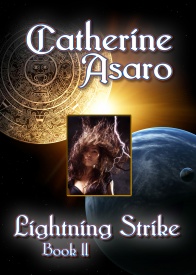
Digital:
Audio:
- This title is not currently available in audio format

